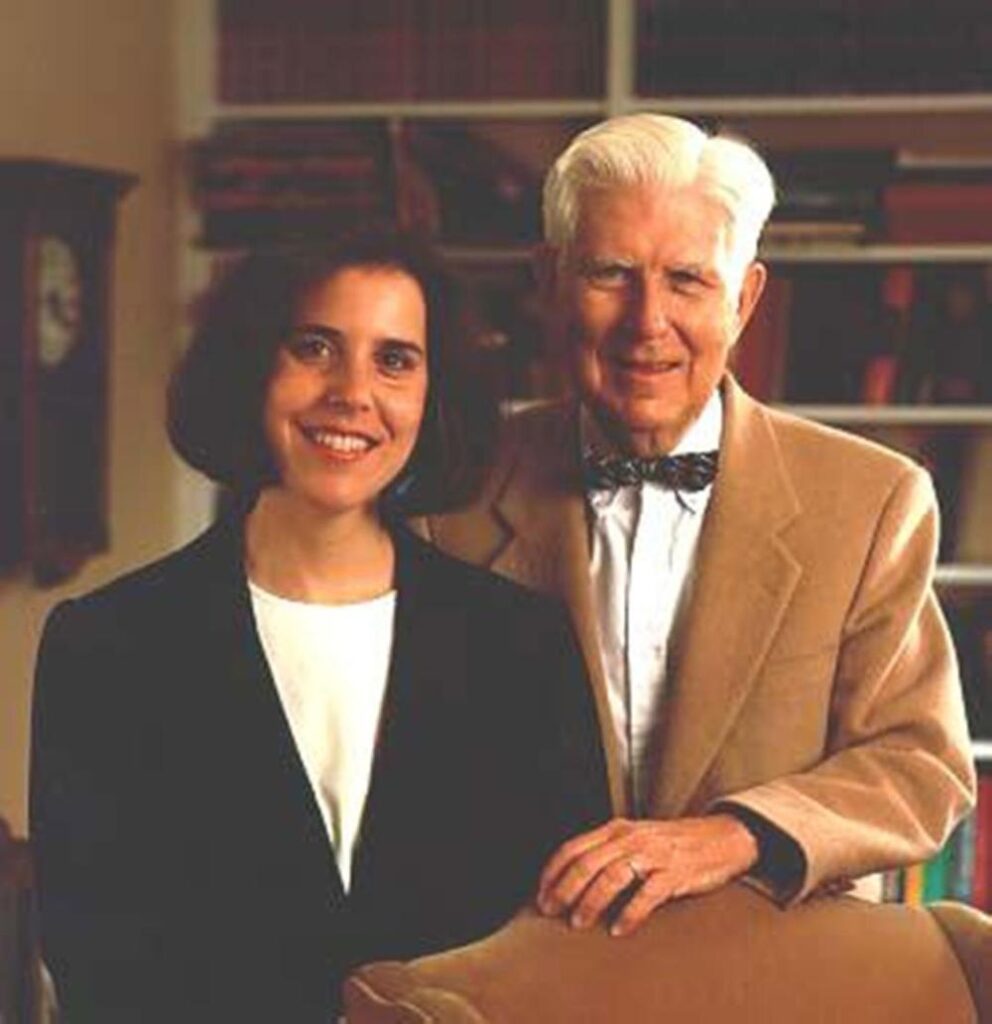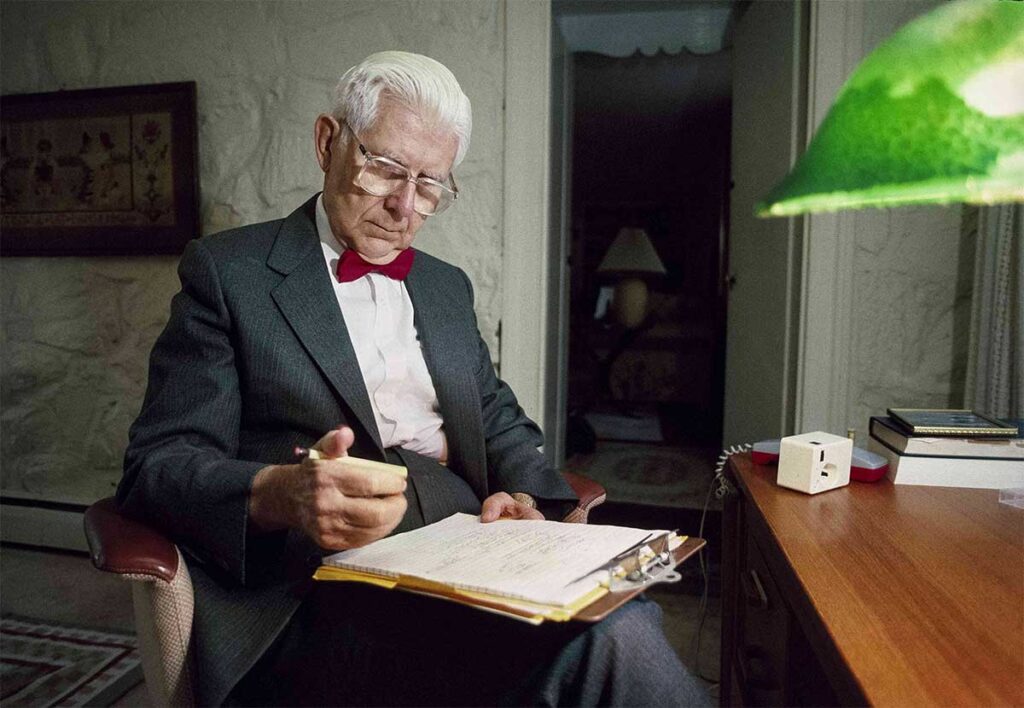Aaron T. Beck, a prominent figure in psychology, significantly changed how we approach mental health.
Known as the founder of Cognitive Behavioral Therapy (CBT), Aaron Beck’s pioneering work has helped countless people manage depression, anxiety, and other mental health challenges.
Born in 1921, his journey from a young scholar to an influential psychologist is inspiring. Beck’s early years and education laid the foundation for his groundbreaking theories. After earning his medical degree, he initially focused on psychiatry. While working with patients, he noticed that their thoughts played a crucial role in their emotions and behaviors. This insight led him to develop CBT, a therapy that emphasizes challenging and changing unhelpful cognitive distortions and behaviors.
Throughout his career, Beck devoted himself to refining and expanding CBT. His work not only provided a new framework for therapy but also offered empirical evidence supporting its effectiveness. He founded the Beck Institute, which continues to train therapists worldwide in CBT and its applications. His contributions remain a cornerstone in psychological treatment and research.
Key Takeaways
- Aaron Beck founded Cognitive Behavioral Therapy (CBT).
- He identified the link between thoughts, emotions, and behaviors.
- The Beck Institute continues his legacy in CBT training.
Early Life and Education
Aaron Temkin Beck, a pioneer in cognitive therapy, was born in Providence, Rhode Island. His journey to becoming a leading figure in psychotherapy included significant early influences and a strong academic background.
Childhood and Early Influences
Aaron Beck was born on July 18, 1921, in Providence, Rhode Island. Coming from a supportive family, he faced challenges early on, including health issues that led him to develop resilience and determination. These early experiences sparked his interest in understanding human behavior and mental processes. His involvement in the Boy Scouts was also significant, teaching him leadership and problem-solving skills. These formative experiences shaped his later work in cognitive therapy.
Academic Pursuits
Beck excelled academically from an early age. He graduated first in his high school class and went on to attend Brown University. At Brown, he majored in English and graduated magna cum laude. He then pursued a medical degree at Yale Medical School. During his time at Yale, Beck’s interests began to focus more on psychiatry and mental health. His rigorous academic training and commitment to understanding human behavior laid the foundation for his later developments in cognitive behavior therapy (CBT).
Foundations of Cognitive Behavioral Therapy
Aaron T. Beck’s work laid the groundwork for Cognitive Behavior Therapy (CBT) by investigating the thought patterns that contribute to mental health issues like depression. His research identified crucial aspects, such as automatic thoughts, which play a significant role in this process.
Development of Cognitive Theory
Aaron T. Beck began his career in psychoanalysis but soon shifted his focus after noticing that people with depression had specific, recurring thoughts. These thoughts, which he termed “automatic thoughts,” were often negative and contributed to the continuation of depressive symptoms. By analyzing these thought patterns, Beck developed cognitive theory, which explains how thoughts, feelings, and behaviors are interconnected.
His work was revolutionary because it provided a structured way to understand and treat depression. Beck’s cognitive therapy methods quickly gained recognition for their effectiveness. This development marked a significant shift from traditional psychoanalytic methods to a more structured, evidence-based approach in psychological treatment.
Establishment of the Beck Institute
In 1994, Aaron T. Beck and his daughter, Judith S. Beck, established the Beck Institute for Cognitive Behavior Therapy. The institute serves as a hub for training, research, and dissemination of CBT techniques. It has become a leading center for cognitive therapy, offering training programs for therapists worldwide.
The Beck Institute focuses on the practical application of CBT, ensuring that therapists are equipped to use these methods effectively. Its establishment marked an essential milestone in the dissemination and standardization of CBT practices. Personally, I am New York State’s first Beck Institute certified CBT psychologist. The institute also provides resources for ongoing research, helping to advance the field and ensure that CBT continues to evolve based on the latest scientific findings.
Impact and Contributions
Aaron Beck’s innovative work in cognitive therapy had a profound effect on modern psychology, contributing significantly to mental health treatment and influencing a broad range of therapeutic approaches.
Key Theories and Models
Aaron Beck developed the Cognitive Model, which suggests that a person’s thoughts directly impact their feelings and behaviors. This model became the foundation for Cognitive Behavior Therapy (CBT). Beck’s theory emphasizes the role of automatic thoughts and core beliefs in shaping emotional responses and behavior patterns.
One of his key contributions was the idea that negative thinking patterns could be identified and changed to improve mental health. His work included the development of several cognitive assessment tools and therapeutic techniques. Beck’s Cognitive Triad—negative views about the self, world, and future—is a central concept in understanding and treating depression.
Influence on Mental Health Treatment
Beck revolutionized the treatment of mental health conditions. He demonstrated through his publications that CBT was effective for a variety of disorders including depression, anxiety, and PTSD. His research showed that CBT could be as effective as medication, especially when combined with it.
His methods are now standard practice for many therapists, making a substantial impact on clinical psychology. Beck’s work inspired further research into cognitive therapies and opened pathways for new treatments. His contributions earned him recognition as a leading American psychologist, shaping the future of therapeutic practices and improving countless lives through evidence-based therapy techniques.
Expanding the Reach of CBT
Aaron Beck’s Cognitive Behavioral Therapy (CBT) has expanded globally, enhancing mental health across various sectors and populations. Its spread includes extensive training and diverse applications.
Global Training and Education
CBT’s reach has been supported by global training efforts, ensuring that more practitioners can deliver this effective therapy. Training programs are available in many countries, not just for psychologists but also for general healthcare workers. For example, large-scale programs in the UK and USA aim to incorporate CBT into routine practice.
Educational institutions now offer specialized courses in CBT for both children and adults, adapting the methods to different age groups. Online courses have further increased access, allowing remote learning for those who cannot attend in-person sessions. Courses in schools, hospitals, and even prisons are designed to train individuals to handle conditions like anxiety disorders and personality disorders.
Diverse Applications of Therapy
CBT’s versatility allows it to treat a wide variety of conditions, including both common and severe mental health issues. It has been adapted for use in treating substance use disorders and is effective with patients facing eating disorders.
In hospitals, CBT helps patients manage chronic illnesses and schizophrenia. Schools are implementing CBT programs to assist students with anxiety and behavioral issues. Prisons use CBT-based approaches to help inmates address behaviors and thought patterns contributing to criminal activity. The therapy’s flexibility makes it suitable for group settings, one-on-one sessions, and even self-help formats.
CBT continues to prove effective across various settings, providing valuable tools for mental health improvement and resilience. That’s what I focus on as a CBT therapist in Port Jefferson, NY.
Legacy and Recognition
Aaron Beck made a significant impact on psychology through his work in cognitive-behavioral therapy (CBT). He received numerous accolades and founded the Beck Institute, which continues to influence the field today.
Awards and Honors
Aaron Beck received several prestigious awards throughout his career. Notably, he was honored with the Albert Lasker Award for Clinical Medical Research, recognizing his contributions to mental health. He also received the Gustave O. Lienhard Award from the National Academy of Medicine for his achievements in medicine.
In addition to these, his development of the Beck Depression Inventory and Beck Hopelessness Scale have been widely used tools in both clinical and research settings, showcasing the breadth of his influence. Beck’s daughter, Judith S. Beck, continues his legacy through her work and leadership at the Beck Institute.
Continued Influence Through the Beck Institute
The Beck Institute for Cognitive Behavior Therapy, co-founded with his daughter Judith Beck, remains a leading center for CBT training and research. The institute offers educational programs aimed at mental health professionals to ensure that Beck’s principles and methodologies are widely adopted.
Martin Seligman, a pioneer in positive psychology, often highlights Beck’s contributions to the field. The ongoing work at the Beck Institute keeps Beck’s theories and practices alive and relevant, helping countless people worldwide. This institution symbolizes Beck’s enduring legacy in the realm of mental health care.
Personal Perspectives
Dr. Aaron T. Beck shared deep insights both on his therapy methods and the future of cognitive therapy. He focused on aiding recovery and held a vision for the evolution of his therapeutic concepts.
Beck’s Reflections on Therapy
Dr. Aaron Beck believed strongly in the power of cognitive therapy to transform lives. He often reflected on how identifying and changing negative thoughts could lead to profound personal change. Early in his career, when he shifted from psychoanalysis to cognitive therapy, he found this approach more effective in addressing patients’ immediate concerns.
He saw hope as a vital component in therapy. According to Beck, therapists must help patients see potential for improvement. Beck’s Recovery-Oriented Cognitive Therapy was designed to emphasize strengths and aspirations, empowering patients to strive for meaningful goals.
The Future of Cognitive Therapy
Dr. Aaron Beck envisioned a future where cognitive therapy evolves and integrates new approaches. He emphasized the importance of ongoing research and adaptation to new mental health challenges. By combining traditional CBT techniques with emerging insights, Beck believed the therapy could remain effective and relevant.
He also advocated for group therapies and tech-based solutions to make CBT more accessible. As CBT continues to grow, its principles can be applied more broadly, potentially aiding more individuals worldwide.
Beck foresaw that continuing innovation would make cognitive therapy a cornerstone of mental health treatment, leading to promising advancements in approaches and methodologies.

Frequently Asked Questions
This section answers common questions about Aaron Beck, his cognitive theory, and the development of Cognitive Behavioral Therapy (CBT). Key topics include his significance in psychology and the principles and techniques he developed.
Who was Aaron Beck and what is his significance in psychology?
Aaron Beck was a psychiatrist who founded Cognitive Behavioral Therapy (CBT). He revolutionized the field of mental health by focusing on how changing thought patterns can impact emotions and behaviors. His work laid the groundwork for modern cognitive therapy.
What are the fundamental principles of Aaron Beck’s Cognitive Theory?
Beck’s Cognitive Theory is built on the idea that distorted thinking leads to emotional distress and maladaptive behavior. Key principles include identifying and challenging negative thought patterns, and replacing them with more realistic and positive thoughts. This approach helps individuals manage their mental health more effectively.
How did Aaron Beck’s work contribute to the development of Cognitive Behavioral Therapy (CBT)?
Beck’s research and clinical work led to the development of CBT. He showed that thoughts influence emotions and behaviors, and that changing unhelpful thoughts can alleviate mental health issues. His methods were evidence-based, making CBT one of the most effective therapies for conditions like depression and anxiety.
Can you outline the main techniques used by Aaron Beck in Cognitive Therapy?
Aaron Beck used several key techniques in Cognitive Therapy:
- Cognitive restructuring: Changing negative thought patterns.
- Behavioral experiments: Testing beliefs through real-world activities.
- Socratic questioning: Guiding patients to discover and challenge their own thoughts.
- Thought records: Keeping track of thoughts, feelings, and behaviors to identify patterns.
What are some key milestones in the history of Cognitive Behavioral Therapy after Aaron Beck’s initial developments?
After Beck’s initial developments, CBT has evolved significantly. The 1980s saw the acceptance of CBT as a primary treatment for depression. In the 1990s, CBT expanded to treat anxiety disorders, PTSD, and other conditions. The establishment of the Beck Institute for Cognitive Behavior Therapy further solidified its importance in the field.
How does Beck’s theory of anxiety differ from other models of understanding anxiety?
Beck’s theory of anxiety focuses on the role of automatic thoughts and cognitive distortions in creating and maintaining anxiety. Unlike other models that may emphasize biological or psychodynamic factors, Beck’s approach is cognitive. He believed that identifying and changing these thought patterns could reduce anxiety significantly.









